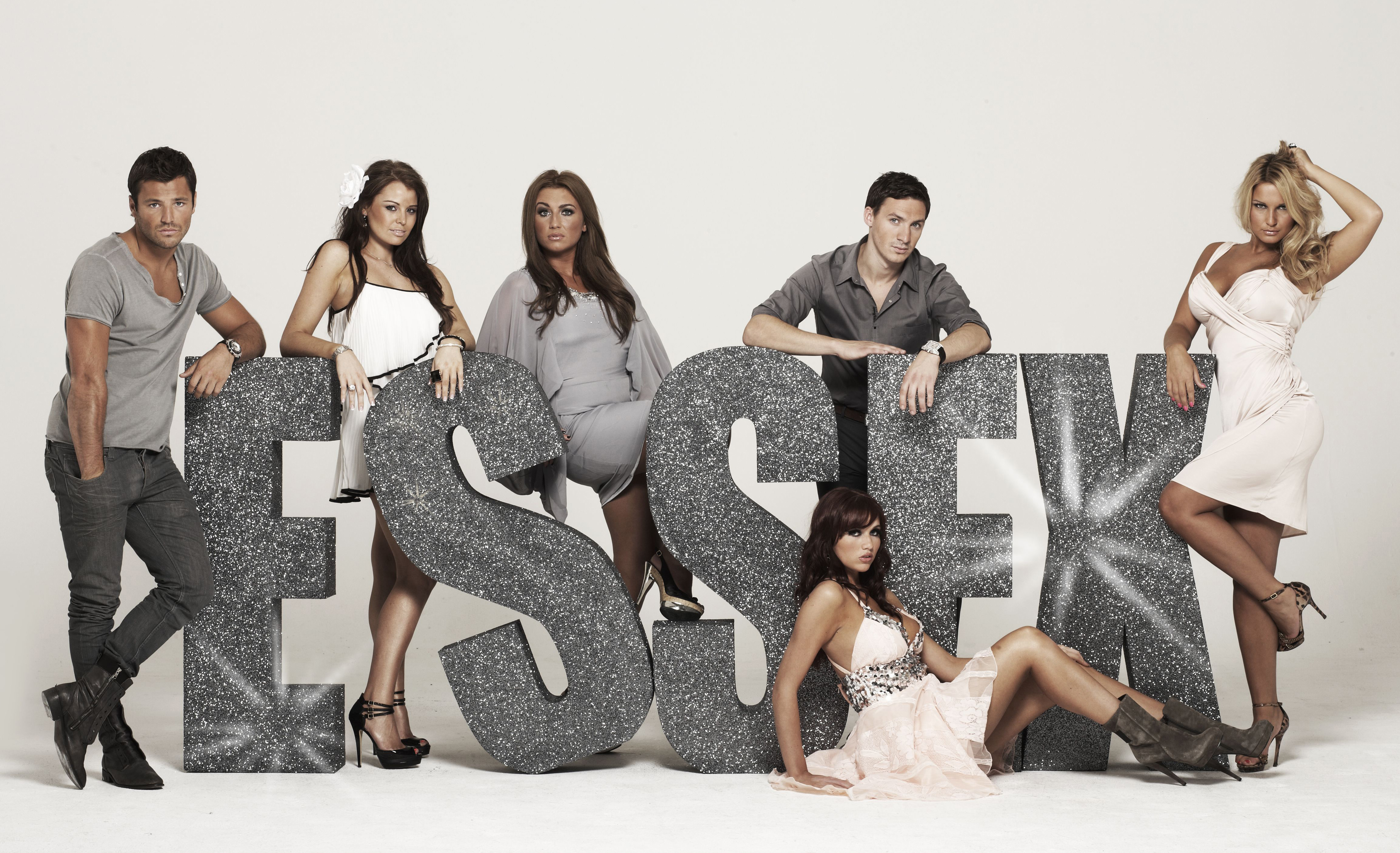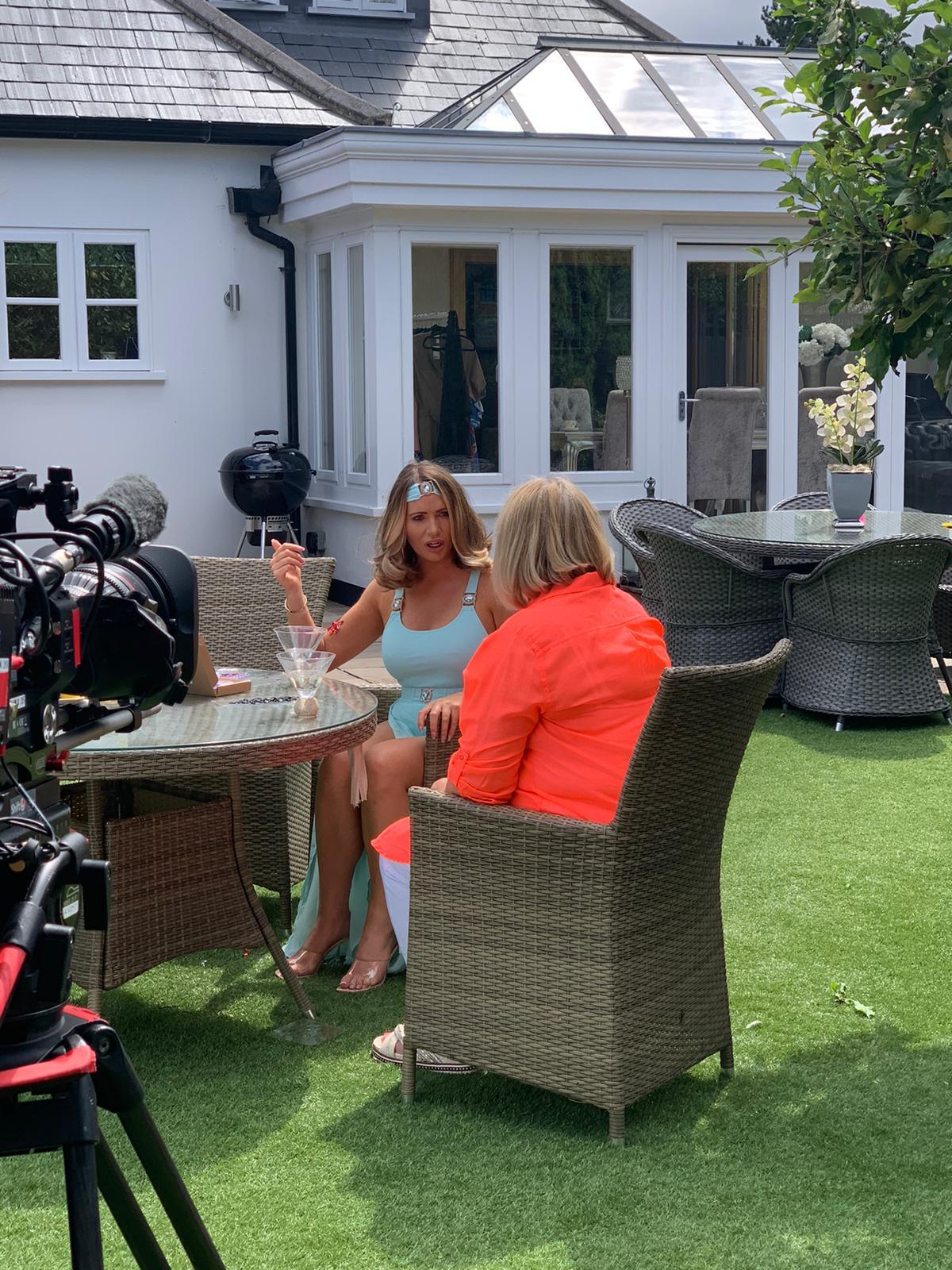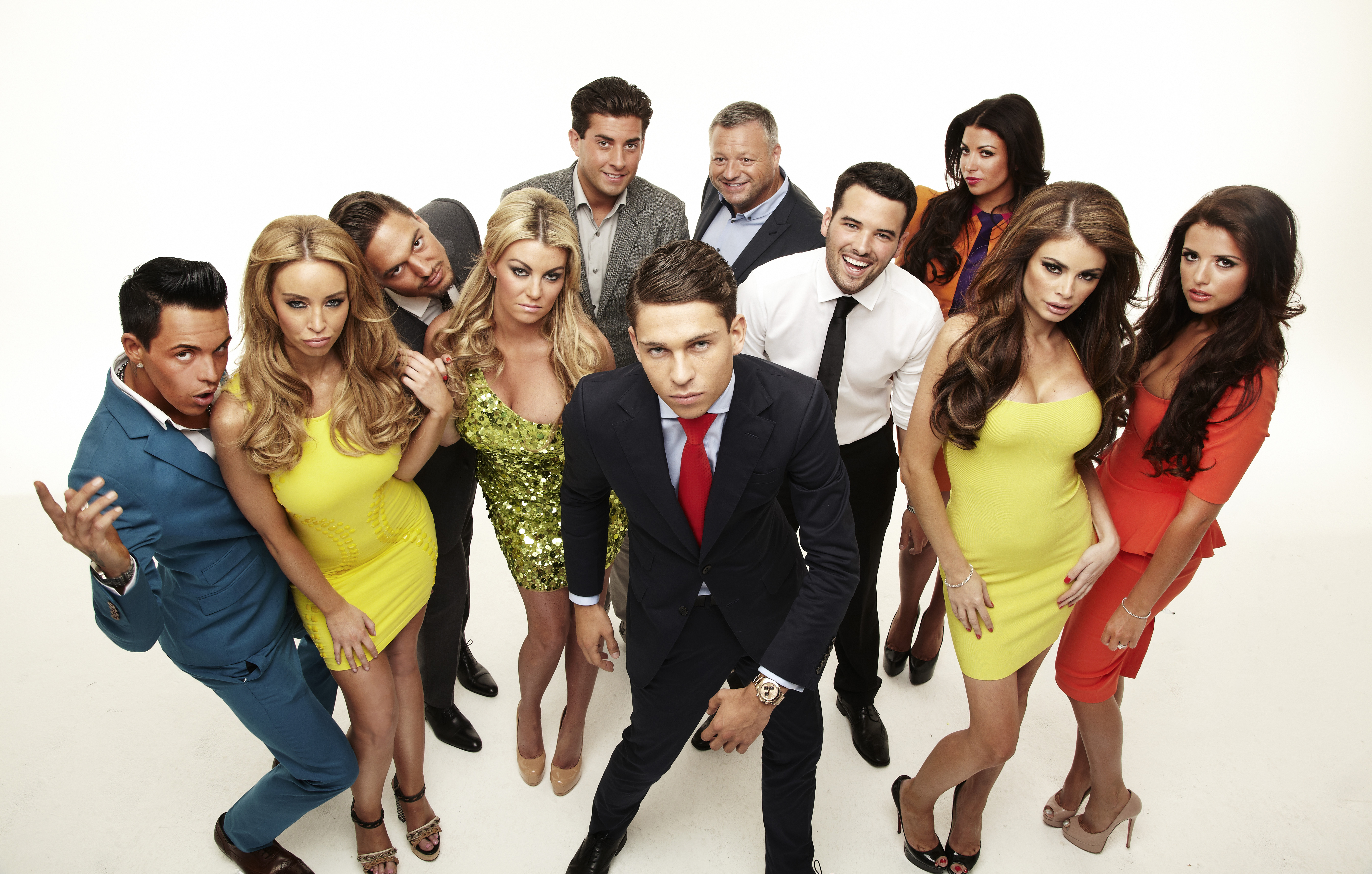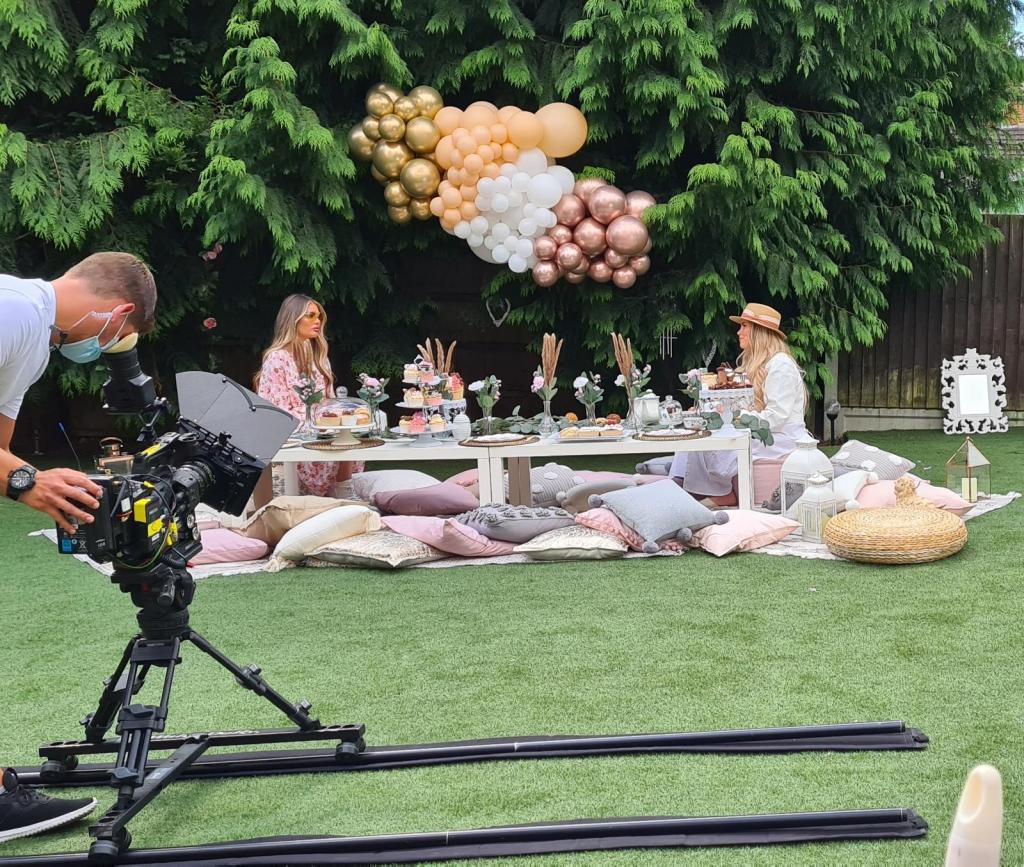“The vajazzle has been a big part of my life.”
Amy Childs is feeling nostalgic today. It’s early evening, and she’s speaking to me from her car, a glossy, black Porsche 4X4 (number plate: WE11 J3L). On her way to collect her two young children after a day of shooting The Only Way Is Essex – the ITV reality show that made her famous, and which she recently rejoined for its 10th anniversary series – 30-year-old Childs has found time to reflect on her legacy.
Videos by VICE
“I still get it now. People are like, ‘Oh my god Amy, do you still vajazzle? You’re the vajazzle queen!’” she laughs. Hearing the word “vajazzle” coated in Childs’ recognisable Estuary twang is almost potent enough to transport me all the way back to 2010. “I’m so happy to be back on the show,” she carries on, bringing us back to the here and now. “It was something that everybody absolutely loved and still talks about now. For me to come back, it was honestly amazing. I feel like I’ve not left.”
Childs was one of the original cast members of The Only Way Is Essex, or as it’s better known, TOWIE, appearing in the first two seasons of the programme in 2010 and 2011. A former beauty therapist, she’s right that she’s best remembered for her expertise in vajazzling (the precise art of applying crystal-shaped stickers to a client’s bikini line), which, as an indicator of an exaggeratedly glam “Essex lifestyle” depicted by the show, quickly became one of its hallmarks – along with spray tans, false eyelashes, and the sheer amount of head-exploding rage it drew from TV reviewers.
Pitched by its creators as “Big Brother without walls” (other than MTV’s The Hills, a US production, Big Brother was the only frame of reference for proper reality TV that the programme makers had at the time), TOWIE represented the beginnings of an uncanny blend of reality and soap, which many initially found jarring. Ultimately, however, the combination of real emotion and structured storylines proved seductive – “How is it filmed? Is it fake? And why can’t we look away?” we asked collectively – as this new genre became the defining TV style of the 2010s, complemented by social media’s growing influence. After TOWIE, Made in Chelsea, Geordie Shore, and the current incarnation of Love Island all followed.
But there was only one OG – and after a whole decade of parties and pettiness, plus the cultural proliferation of the phrase “I’m Gemma Collins, Ferne; I’m 34, I’ve earned my divaship,” TOWIE is still on air, for two seasons a year. So how has the show that changed everything managed to survive in such a saturated market? And seriously, how the fuck do they actually make it?

As of the time of writing, 38-year-old mum-of-one Chloe Sims, a TOWIE cast member since 2011, has appeared on 282 episodes of the show, which is more than anyone else who has stepped through the Sugar Hut’s storied doors. She’s on set when she calls me at 8.30PM on a Friday, about to shoot a pivotal scene for her storyline this season, which centres around the real life fact that she and her best friend and co-star Pete Wicks haven’t spoken since before the UK went into lockdown in the midst of a global pandemic. Her first contact with Wicks only happened recently, when they’d filmed what TOWIE calls a “bump in”.
“I think he was given the opportunity to reach out to me, and I was given an opportunity to reach out to him on camera. I refused, and I’m guessing he refused, because our first scene is a bump in,” Sims says. “On TOWIE, a bump in is when you just bump into someone that you’ve got confrontation with.”
“They’ll just say to you, ‘Look, we’re rolling, you’re walking, you’re gonna bump into him and whatever happens happens,’” Sims explains. “For a TV show that can be quite tricky, because that could have been, like, a two second scene. But we ended up having a conversation, and therefore there is a scene for TOWIE. Had I decided to leave the scene and walk straight out, that would have been fine as well.”
That the element of surprise is often so strong during the making of the show will probably be unexpected for some, because questions about whether or not TOWIE is scripted have hung over it since Denise Van Outen uttered the show’s famous disclaimer at the top of the first ever episode: “The tans you see might be fake, but the people are all real, although some of what they do has been set up purely for your entertainment,” it goes. For Sarah Tyekiff – TOWIE_’s executive producer and the head of Unscripted TV at Lime Pictures, the company that makes the show – that statement is a bit of a bugbear. In fact, she says, it’s the one thing about _TOWIE that she would change if she could do it all again.
Of course, scenes are set up and locations are booked – anyone who has seen the show knows this – but once the cameras are rolling, there is no input from the production in terms of how the cast members behave. “It is unscripted,” Tyekiff elaborates. “We don’t tell people what they’re going to say, and sometimes people walk into scenes and they don’t know they’re going to be there. It was quite hard to work out how much was scripted and how much was real until I got to Lime, and then I was pleasantly surprised that it was authentic. Actually, you watch the stuff and it’s so real because the cast are so brilliant, and give themselves to it so much.”
Ultimately, _TOWIE_’s cast are its lifeblood. From red wine swiller extraordinaire Lucy Mecklenburgh, to the inventor of “reem,” Joey Essex, via the GC herself (who was recently bestowed with _TOWIE_’s “Most Iconic” award in a 10 year anniversary special; she thanked viewers who voted for her in a pre-recorded video on a yacht), the personalities who have appeared on the show over the years make it what it is, in more ways than most probably realise.
When a new series of TOWIE is about to start filming, cast members give show bosses the lowdown on what’s been going on in their lives, and this is how the producers start to piece together what the upcoming series will cover. As with all reality shows in the UK, stars undergo a psychological evaluation to ensure they’re able to start shooting (they also have access to the show’s psychologist for the duration of filming, and afterwards). Then, Tyekiff explains, the work begins. “The execs will sit down with them in the office one-on-one, and find out what’s coming up in their lives over the next three months,” she says.
From Sims’ perspective these conversations flow quite naturally, because TOWIE has been her job for almost ten years. “I’ve been here such a long time that these people have become my friends, so I would confide in them about all aspects of my life – they know everything, but I will sometimes try and hold things back. So I’ll tell them and then go, ‘but I don’t really want to do that’, and they’ll work with me. They’ll cover what I’m happy with basically,” she says, though she does note that the fact that the show has to be edited down so much can be “frustrating at times.” Even if a scene takes three quarters of an hour to film, it will be cut down to only a few moments, so that episodes meet their 65-minute run time. “If I feel like I’ve made a really strong point, sometimes it won’t go in,” Sims explains.
Once filming begins, the cast members stay in constant contact with _TOWIE_’s Cast Liaison Team, who feel out the development of various storylines on set basically in real time. “What the Cast Liaison Team are working out on the ground are the feelings of everyone,” Tyekiff tells me. “Who’s rubbing who up the wrong way, who wants to date someone. They will be the first to know if someone’s got the hots for someone else – more than the cast members even, sometimes. They’ll be watching them flirt over the tea station or whatever, so they’re the eyes and ears on the ground. And they bring the story back to the story producer room, who then put it together to make the show.”

One of _TOWIE_’s trump cards is the fact that even in an industry like TV, where staff turnaround can be high, the people who work behind the scenes come back series after series. CLT members might eventually move up to the story department, which Tyekiff suggests is one reason why the show is able to produce a story that’s totally led by what cast members are comfortable with. “Because the story team have also done the Cast Liaison job, they know that something could be an interesting storyline but it might be that we need to talk to the cast member if we’re going to follow it, because it might be a bit sensitive,” she explains.
In 2020, cast welfare on reality TV is paramount. For every dramatic scene there are real people on whom a real situation has taken a toll in lots of different ways, so these kinds of protections are increasingly important. For this article I spoke to four different cast members and, for most of them, a frequent area of distress is the response they receive on social media.
TOWIE_’s decade on screens has coincided with the evolution of social media into something that pervades all of our lives. And as we’ve learned, ultimately those in the public eye – particularly reality stars – are more vulnerable than the rest of us to unprovoked abuse on platforms like Twitter and Instagram. Cast member Courtney Green, who, at 25, has been with _TOWIE for five years, tells me that she hates Twitter so much, she hides the app in a locked-away folder on her phone.
“I just don’t ever want to check it,” she says. “People are just so horrible. They’ll judge you no matter what you do. People have arguments every day in their lives. People argue with their friends, people say mean things, and we get attacked for doing that. Because you’re on camera, people feel like they can say these things to you.” Via social media, Green has experienced abuse based on her appearance, and even death threats.
The show is well aware of its cast’s higher-than-normal exposure to sustained insults and negativity online. Rachel Hardy, Lime Pictures’ Head of Press and Digital, has worked on TOWIE since its very beginnings, and details for me how her team helps stars navigate the landscape of social media.
“When the cast first join, they get a set of social media guidelines and some training on how to use the platforms,” Hardy says. “The focus used to be on how to best use social media for commercial gain, promotion, and that sort of thing. Now the focus is very much on how to deal with it. At the most basic level, in the early days, the advice would be: don’t engage with the Twitter trolls, just ignore it. Whereas actually what we’ve learned over the last four or five years is that advice is redundant, and it’s not helpful to people. They are going to read it, and they are going to react. So a lot of the support now is based on helping them to process and deal with that.”
In recent series of TOWIE, social media abuse has even become a storyline. 34-year-old cast member Bobby Norris, who is gay, receives a huge amount of vitriol via social media, and he brought his situation to the show. During a phone conversation, Norris’ usually jovial and happy-go-lucky manner falters when he explains to me how severe the messages he receives can be: “I’ve been sent the most horrendous images and videos – you could never imagine,” he explains. “My face imposed onto corpses, and bodies hanging from a rope. I mean, darker than dark.”
This level of sustained abuse was what drove Norris to decide that enough was enough. One night last year, sat at home, outside of his TOWIE filming cycle, Norris started an official petition, the aim of which was to make online homophobia a specific criminal offence. The initial petition ballooned into a national campaign, and TOWIE has been documenting Norris’ efforts ever since.
“We’re always in touch with the psychologist, and we have psych chats regularly – before we start the series, during, and after,” Norris tells me. “So they were aware that I was getting it, because I’d opened up to the Cast Liaison Team about it. My trolling is always generally homophobic or about how I look. I’m old enough and consider myself to have a thick enough skin to deal with it, but so many people can’t.”
The show has tracked Norris visiting Parliament to discuss his petition with MP Angela Eagle (“Can I call her Ange?” he wondered aloud before their scene together), as well as filming on Loose Women and giving talks to college students about his experiences. It’s a far cry from the early perception of the show that many still hold now, which Hardy says can be frustrating. “Some people still think of it as vajazzles and fake tan, which of course it is, and we’ve always really celebrated those brand values,” she says. “But I think sometimes I wish people realised how much it has progressed.”
After receiving so much criticism in its early years, which mostly took the form of hand-wringing over whether reality TV would rot everyone’s brains, TOWIE has survived by evolving to balance the drama and lavish events with references to social issues that resonate with its audience. Over the last few series’, viewers have seen Green go for a smear test on camera after turning 25 (the age at which women should book in for their first examination in the UK), and heard cast members Tommy Mallet and Liam “Gatsby” Blackwell candidly discuss their experiences of poor mental health and loneliness.
“I think particularly Tommy Mallet’s mental health storyline was really powerful, because it really did contradict that traditional view of an Essex man,” Hardy says. “He had such a massive response and really will have changed viewers’ lives. What more can you ask for in terms of working on a TV show?”
Tyekiff is very clear that socially conscious storylines are the key to how TOWIE continues to evolve. “I think how we grow as a production, how we keep sustaining, is that we have to be current,” she tells me. “When it’s about showing personal issues, it can’t be vacuous and have no substance because these things are happening and it would be wrong for us to ignore them. I think the cast have grown up and changed quite a lot in that they wouldn’t want that either.”
The way to understand the shape that TOWIE takes in 2020 and beyond is to think of the part of its DNA which is clearly influenced by soaps. In the same way that soaps bring social concerns to their audiences, reality shows fulfil the same function for a new generation. “It’s enabling conversations to be had at home. People can refer to something on the TV, and they’re actually having the same conversation with their 16-year-old daughter,” Tyekiff says. “They can say, ‘That was amazing to see how Tommy felt in TOWIE.’ How can a mum have that conversation with their 16-year-old son? If they can relate it to TV and use that as an excuse to get in, that gives them a whole different angle. And that’s why the responsibility of it is quite important, because that is what you’re doing – raising social issues.”

As Childs continues on her drive home, heading towards a well-earned glass of Prosecco, she thinks back to a time before TOWIE.
“I was the head therapist at a salon in Essex. I had a really good job, I worked full time. Then, all of a sudden, I got the phone call asking me, ‘Would you go on a show called The Only Way Is Essex?’ And I thought, ‘Do you know what? I’m gonna do it, I’ll just go back to my normal job after.,’” she tells me. “Ten years ago, we didn’t know what it was going to be about. We knew it was going to be a reality show, but we didn’t really know the concept of it all.”
For Norris, who taught hairdressing to NVQ students before he was cast on TOWIE in 2012, the show changed both TV and his life. “I’m a big believer in fate, and I was in the right place at the right time. I don’t think us lot back in the day – us old lot, the old school TOWIE – ever thought it would be around this long, because ultimately it’s a show about us, our friendship group, us going about our lives.”
He laughs, pausing for what I can only imagine is TOWIE-honed dramatic effect.
“It’s like a living diary – and it’s on the ITV Hub and YouTube, forever.”
TOWIE airs on Wednesdays and Sundays at 9PM on ITVBe.
More
From VICE
-

Actress Kaitlyn Dever. Photo by Matteo Prandoni/BFA.com/Shutterstock -

-

-



